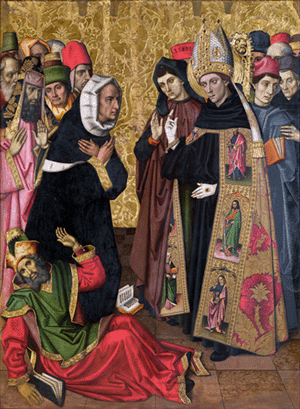
Heresy
In Christianity, "heresy" is the formal denial or doubt of a core doctrine of the Christian faith. Appreciation of heresy requires an understanding of the development of orthodoxy and the role of creeds in the definition of such orthodoxy. This is essential because heresy is always defined in relation to orthodoxy. Orthodoxy has been in the process of self-definition for many centuries.
The word heresy comes from "haeresis," a Latin form of the Greek word αἵρεσις originally meaning choosing or choice, and sometimes used to mean a sect or school of thought. In the New Testament, the word is indeed translated as "sect," and was appropriated by the Church to mean a division that threatened the unity of Christians. Heresy went on to mean simply a departure from orthodoxy. Note: Heresy should be distinguished from apostasy, which means the total abandonment of the Christian faith after it has been freely accepted.

In the early Christian Church, there were many, far-flung practicing communities, and its likely that what was orthodoxy for one, was heresy for others. Some argue that distinctions between Jewish Christians, Gentile Christians, and other groups such as Gnostics and Marcionites made early Christianity quite fragmented with contemporaneous competing orthodoxies. However, others are persuaded that "what became official orthodoxy was taught early on by the majority of church teachers, albeit not in fully developed form."(H.E.W. Turner)
Before the time of the Nicene Council, there existed a great number of Christian sects and movements with strong unifying characteristics lacking in the apostolic period. They had different interpretations of Scripture, particularly with regard to the divinity of Jesus and the nature of the Trinity. Some of the major movements with different interpretations of Scripture from those of the early orthodox church included:
- Gnosticism – relied on revealed knowledge from an unknowable God who is distinct from the Demiurge who created the material world
- Marcionism – believed that the God of Jesus was a different from the Old Testament God
- Montanism – relied on prophetic revelations from the Holy Spirit
- Adoptionism – believed Jesus was not born the Son of God, but was "adopted" at his baptism, resurrection or ascension
- Docetism – believed Jesus was pure spirit and his physical form was an illusion
The earliest controversies in the 3rd and 4th centuries were Christological in nature, and concerned the eternal divinity and humanity of Jesus. In the 4th century, Arianism taught that Jesus, though not merely mortal, was not eternally divine and was of lesser status than God the Father. Arianism was condemned at the Council of Nicea (AD 325), but did dominate most of the church for much of the 4th century. Trinitarianism held that God the Father, God the Son, and the Holy Spirit were all one being with three persons. A 4th-century antinomian sect from Macedonia called the Euchites declared that the Threefold God transformed himself into a single person so as to unite with the souls of the perfect. They opposed a clergy and rejected baptism and the sacraments.
Some followed dualistic belief, with reality being made up of opposing parts of matter, which was evil, and spirit, which was good. Docetism taught that Jesus' humanity was entirely an illusion and denied the incarnation. Others proposed that because the material and spiritual worlds were both created by God, they were therefore both good. In response to these various teachings, the orthodox position became that Christ was fully divine and at the same time fully human, and that the three persons of the Trinity are co-equal and co-eternal.
